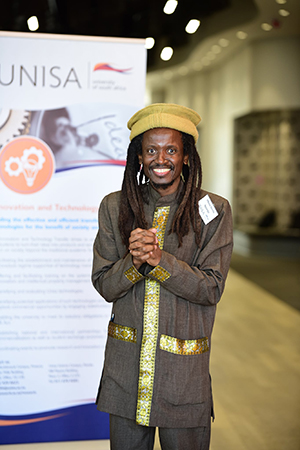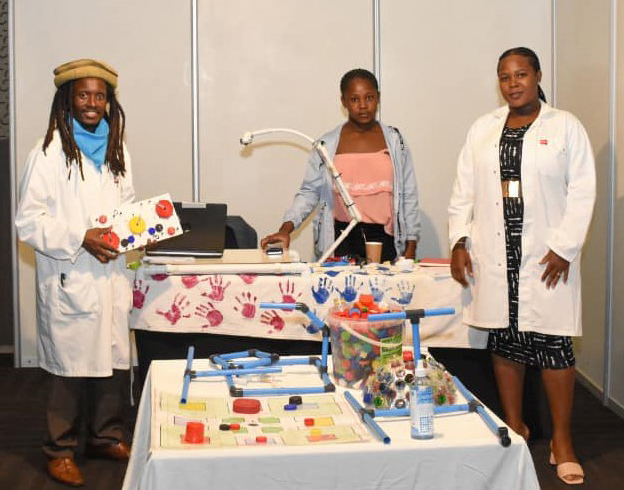News & Events
Innovator in the service of humanity earns a training opportunity in Switzerland

Mbuso Ngcongo
Mbuso Ngcongo, a Bachelor of Science in Computing student, is one of the winning innovators earmarked to attend a training programme in Switzerland, in September of this year.
This tech giant in the making pitched his innovative idea for the Umbalabala Education Toolkit at the Swiss and African Science and Business Innovators (SASBI) Kigali Conference 2022, held in Rwanda.
Learning, teaching and assessment made easy
The Umbalabala Education Toolkit is a collection of novel methods and apparatuses for making learning, teaching and assessment easy, especially in Foundation Phase classrooms. The low-cost, high-quality toolkit, built largely from re- and upcycled waste plastic materials, is designed to accelerate learning, to capacitate and prepare learners for the Fourth Industrial Revolution, through the use of inclusive technology. The toolkit forms part of an innovative, integrated, and explorative learning method that makes learning fun, easy, enjoyable, and effective. As Ngcongo explains:
“The construction of the toolkit is informed by many studies attesting to the fact that children learn faster through exploring with most of their senses, such as hearing, touch, smell, taste and sight. It comes as no surprise that one of the oldest and most effective learning methods is the Montessori method, developed by an Italian physician and educator, Dr Maria Montessori, in the late 18th century.
The ‘Hole in the Wall’ experiment by computer scientist, Sugatra Mitra is another recent study that informs our strategy.”
Umbalabala seeks to provide such a method of learning, contextualised within the computational learning framework.
The impact of social challenges on the South African public education sector
In 2021, while studying towards the Bachelor of Science in Computing at Unisa, Ngcongo investigated, through a literature review, which social challenges have had a negative impact on the public education sector over the past ten years (2011–2021).
He has since authored a paper entitled “The impact of social challenges on the South African public education sector”. Currently under peer review, the paper investigates those factors which Ngcongo terms DIP3C – digital divide, inequality, poverty, crime, corruption, and Covid-19 – all of which significantly affect the outcomes of public education.
“Some of the shocking findings from the study were that criminals had vandalised and looted nearly 2 000 public schools over the latter part of the decade, and ICT equipment had not been spared,” Ngcongo laments. Effectively, this has widened the gap between those who have access to computing devices and those who do not, and these acts have reversed the gains of a democratic dispensation.
Ngcongo seeks to help school children and educators reap the benefits of the power of computers, without exposing schools to the risk of being targeted by criminal elements for housing expensive equipment.
The toolkit has since been tested through a pilot project involving 526 children, 243 parents, 44 teachers, and volunteers in the Foundation Phase. Ngcongo believes the results are very encouraging and highly impressive: “Over a three-month period, learning was accelerated, especially at a time when learners had lost almost three-quarters of the learning and teaching time, due to Covid-19.”

Mbuso Ngcongo, Esihle Mzizi and Nokuthula Mzizi demonstrate the Umbalabala Education Toolkit at a recent exhibition at the Durban ICC organised by the Moses Kotane Institute
Unisa’s Department of Research, Innovation and Commercialisation asked Ngcongo about his experience at the Kigali Conference, and his expectations of the training programme in Switzerland.
How was your experience of participating in the Kigali Conference?
Participating in SASBIC, in Kigali, the capital of Rwanda, would not have been possible without Unisa, the university that carries the name of our beloved South Africa. My participation was part of the university’s support and incubation programme, which assists students who successfully participate in the Student Innovation Challenge, managed by the Directorate for Innovation, Technology Transfer and Commercialisation (DITTC). The opportunity therefore follows my successful participation in that competition, in December 2021.
This momentous experience was life-changing for me, personally, from the moment we landed at the airport in Kigali. Although I have travelled to many countries around the world, this was my first visit to an African country. I did not know what to expect, especially following the relatively recent and well-documented 1994 genocide.
The high level of professionalism, and the sincere warm welcome I received, made me feel at home from the outset. This feeling was shared by the rest of the Unisa delegation, including one of the most successful and prominent innovators, Professor Marcia Mkansi, and Basanda Pongoma from the DITTC.
When we arrived, Rwandans were participating in a national campaign aimed at promoting a healthy lifestyle, by discouraging the use of vehicles and motor-powered transport. The main roads were only open to pedestrians, who could run, walk or cycle as part of the healthy living campaign. Notably, on the last day, as we were departing, there was another campaign to clean up the streets, with communities going out to pick up litter voluntarily.
Our hosts at the University of Rwanda went out of their way to ensure that our experience would be a memorable one, well worth the journey.
What does winning the pitching competition at Kigali mean for you and your innovation?
Winning the pitching competition in Kigali means a lot not only for myself but also for others. As a founder and director of Watoto Wazania NPC (the African Child), I voluntarily carry on my shoulders a proverbially heavy burden in the form of the aspirations of millions of children across this continent; children who would otherwise be excluded from participating as active players in the digital economy, as a result of the social challenges I outlined above.
The quality of all the pitches presented was absolutely outstanding, with delegates hailing from diverse African countries, including Kenya, Nigeria, Rwanda, South Africa and Uganda. Having to wait for the announcement of the winners for a nerve-wracking three days, meant nobody knew what to expect, following the pitch. There were so many young people displaying so much talent, passion and skill. However, it was absolutely humbling and heart-warming to see my name and Unisa on the big screen on the day the results were announced. For that reason, I do not take my win lightly at all – it remains our biggest highlight as a team of Unisa entrepreneurs.
What are your expectations of the training programme in Switzerland?
I have never been to Switzerland, and I am very excited about the prospective training programme. As a university student in the Science and Technology field, I have aspired to visit Switzerland, in particular the State Secretariat for Education, Research and Innovation (SERI) and the European Laboratory for Particle Physics (CERN). But I have always imagined these places to be inhabited by really smart nerds, doing cool things, like firing rockets to the moon. Now I have a chance to learn from these incredible people, and hope to come back home to inspire many of our youth.
Moreover, as an inventor with at least one patent to my name, I am receptive to learning a lot, and would wish to identify and customise solutions from Switzerland that are relevant to our African environment, where we are still a few light years behind, technologically speaking.
While I am very grateful for this opportunity, I think the world has genuinely come to the realisation that it cannot advance very far if Africa continues to lag behind. I firmly believe Africa has a meaningful contribution to make, globally, and I think the world is receptive to idea of mutually beneficial collaborations. I expect to use this time to learn more about how we can work together in Africa, to create better solutions for ourselves.
I conclude by echoing the words of Unisa’s Principal and Vice-Chancellor, Professor Puleng LenkaBula, who on the first day of April 2022, said: “I believe that we as human beings can never flourish if we do not think of ourselves as inextricably bound with the environment in which we live.”
* By Mpho Moloele, PR and Communication, Department of Research, Innovation and Commercialisation
Publish date: 2022-05-05 00:00:00.0

